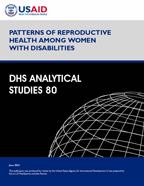- PUBLICATIONS
- JOURNAL ARTICLES
- ACCESS PUBLICATIONS
Publications Summary
- Document Type
- Analytical Studies
- Publication Topic(s)
- Disability
- Country(s)
- Mali, Nigeria, Rwanda, Senegal, South Africa, Uganda, Pakistan, Timor-Leste, Haiti
- Language
- English
- Recommended Citation
- MacQuarrie, Kerry L. D. and Julia Fleuret. 2022. Patterns of Reproductive Health among Women with Disabilities. DHS Analytical Studies No. 80. Rockville, Maryland, USA: ICF.
- Download Citation
- RIS format / Text format / Endnote format
- Publication Date
- June 2022
- Publication ID
- AS80
Download
 Patterns of Reproductive Health among Women with Disabilities (PDF, 1660K)
Patterns of Reproductive Health among Women with Disabilities (PDF, 1660K)
 Patterns of Reproductive Health among Women with Disabilities (AS80) - Analysis Brief
Patterns of Reproductive Health among Women with Disabilities (AS80) - Analysis Brief
Download this publication
Associated publication(s):
There is no printed copy available to order.
